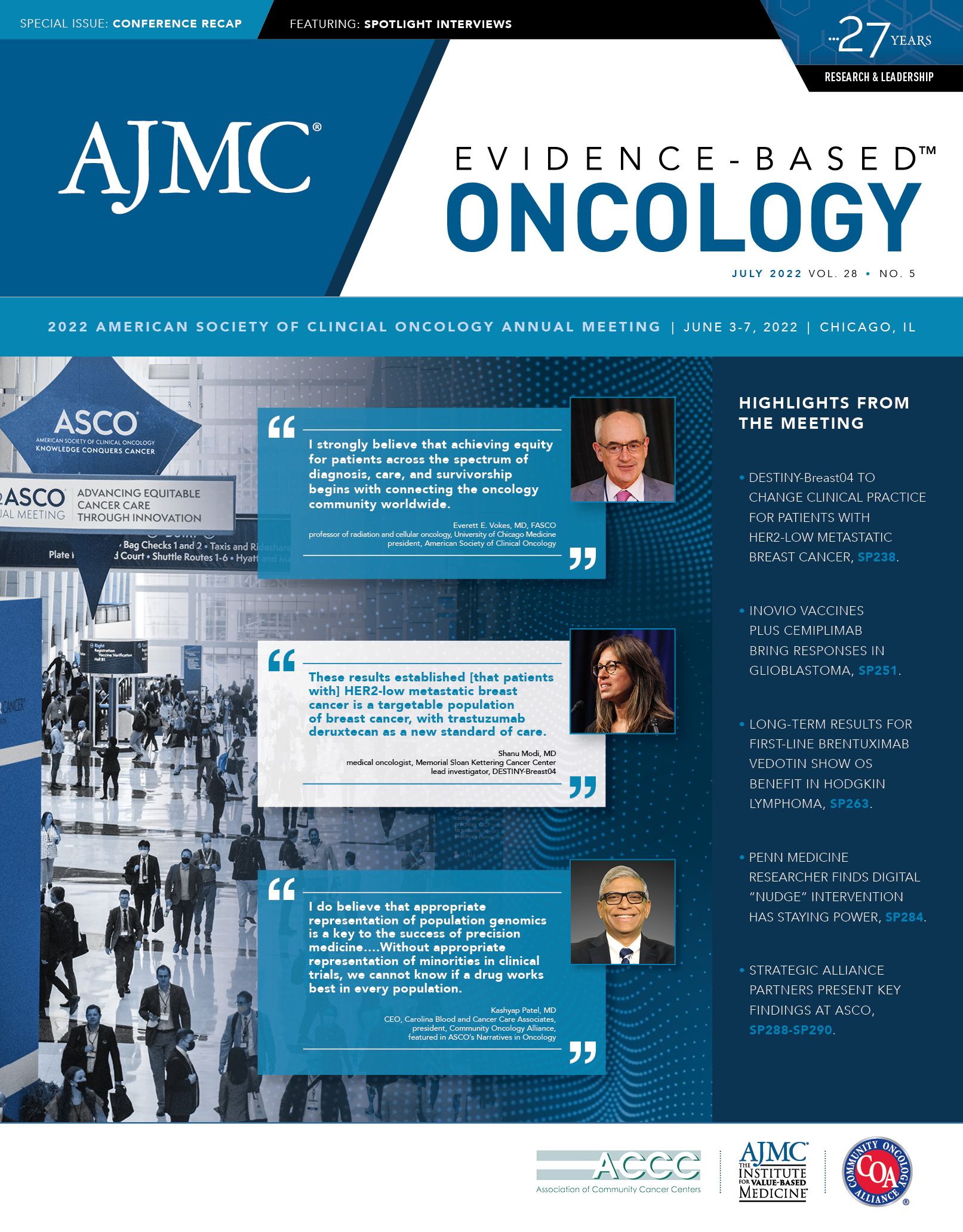- Center on Health Equity & Access
- Clinical
- Health Care Cost
- Health Care Delivery
- Insurance
- Policy
- Technology
- Value-Based Care
In KRYSTAL-1, Adagrasib for NSCLC Has 43% Response Rate
Phase 2 results for adagrasib, a KRAS G12C inhibitor, showed promise for the treatment of patients previously treated for KRAS G12C-mutated non–small cell lung cancer (NSCLC), with no new safety signals seen.
Adagrasib selectively binds to KRAS G12C and renders it inactive, making the drug potentially useful across multiple tumor types. The Food and Drug Administration has already accepted a new drug application for adagrasib’s use in NSCLC based on results from this study, called KRYSTAL-1 (NCT03785249).1 The findings, presented at the 2022 American Society of Clinical Oncology Annual Meeting, were also published in the New England Journal of Medicine.2
Alexander I. Spira, MD, PhD, FACP, director of Virginia Cancer Specialists Research Institute and the Phase I Trial Program, presented the results on behalf of the KRYSTAL-1 investigators. He stated that the trial had been carried out during extraordinary circumstances. “I want to acknowledge the patients and their families for making this trial possible [and], most importantly, all the clinical study teams and investigators, especially at all the sites doing this trial during the height of the pandemic and candidly one of the most challenging times I’ve ever been involved in clinical research.”
Among the initial 116 patients in the study, 98.3% had received both chemotherapy and immunotherapy previously. Spira said that 112 patients were evaluable, and they were similar to the population with NSCLC—65% of the patients were female, the median age was 64 years, and 96% were current or former smokers.
Among the evaluable patients, 43% responded to adagrasib, and the disease control rate was 80%. According to Spira the overall response rate (ORR) was 51% when calculated without including those patients who received scans too early or left the study. The duration of response was 8.5 months (95% CI, 6.2 to 13.8). Results also showed the following:
- Median PFS was 6.5 months (95% CI, 4.7-8.4).
- As of January 15, 2022 (median follow-up, 15.6 months), median OS was 12.6 months (95% CI, 9.2-19.2).
- Among those with previously treated central nervous system metastases, intracranial ORR was 33.3% (95% CI, 18.0-51.8).
Spira said most patients were able to tolerate the drug, although 52% had dose reductions; 7% discontinued treatment. Treatment-related adverse events were seen in 97.4% of patients; 52% of patients had grade 1 or 2. Two patients died.
A phase 3 study, KRYSTAL-12 (NCT04685135), is already underway that will compare the effectiveness of adagrasib vs docetaxel, Spira noted. The primary completion date is set for August 2023.3
References
1. US Food and Drug Administration (FDA) accepts Mirati Therapeutics’ New Drug Application for adagrasib as treatment of previously treated KRASG12C-mutated non-small cell lung cancer. News release. Mirati Therapeutics, Inc. February 15, 2022. Accessed June 20, 2022. https://prn.to/39EXD3z
2. Jänne PA, Riely GJ, Gadgeel SM, et al. Adagrasib in non-small-cell lung cancer harboring a KRASG12C mutation. N Engl J Med. Published online June 3, 2022. doi:10.1056/NEJMoa2204619
3. Phase 3 study of MRTX849 (adagrasib) vs docetaxel in patients with advanced non-small cell lung cancer with KRAS G12C mutation (KRYSTAL-12). ClinicalTrials.gov. Updated June 9, 2022. Accessed June 20, 2022. https://clinicaltrials.gov/ct2/show/NCT04685135

Quality of Life: The Pending Outcome in Idiopathic Pulmonary Fibrosis
February 6th 2026Because evidence gaps in idiopathic pulmonary fibrosis research hinder demonstration of antifibrotic therapies’ impact on patient quality of life (QOL), integrating validated health-related QOL measures into trials is urgently needed.
Read More
Building Trust: Public Priorities for Health Care AI Labeling
January 27th 2026A Michigan-based deliberative study found strong public support for patient-informed artificial intelligence (AI) labeling in health care, emphasizing transparency, privacy, equity, and safety to build trust.
Read More
